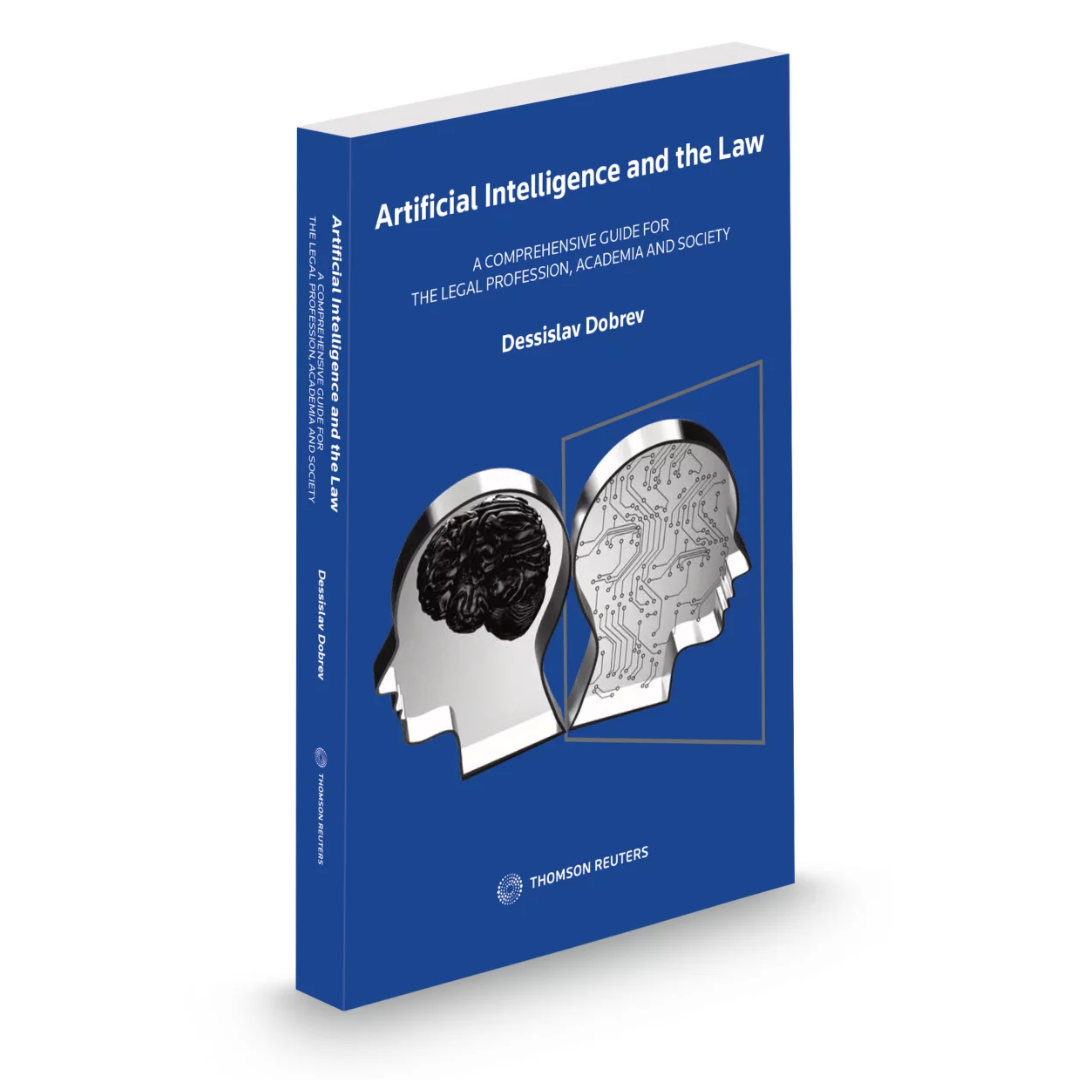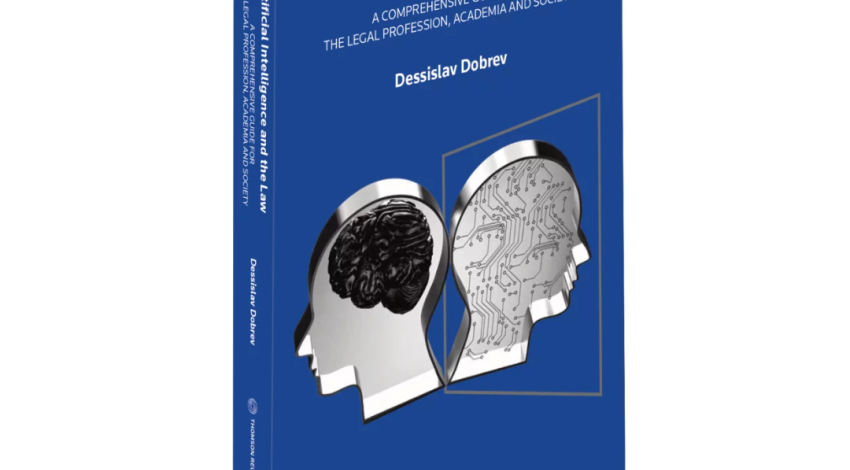Meet the AI expert: Dessislav Dobrev (LLM 2002)

Dessislav Dobrev (LLM 2002) is a leading expert in artificial intelligence and the law and has spearheaded AI matters in both academia and practice. A proud U of T Law graduate, Dessislav now serves as Senior Counsel at the World Bank Group (MIGA).
His recent book Artificial Intelligence and the Law: A Comprehensive Guide for the Legal Profession, Academia and Society, published by Thomson Reuters, has been endorsed by high-profile academics, leading law practitioners and global AI leaders. This timely volume is one of the first comprehensive studies of how AI will dramatically affect the law, both as a profession and a regulatory domain, as well as society at large.
In addition to his critical work with MIGA, this past summer Dobrev was appointed to serve on the New York State Bar Association’s Task Force on Artificial Intelligence. The task force is dedicated to identifying potential benefits, dangers, and opportunities surrounding AI and to make regulatory recommendations for how to manage and integrate the technology in legal practise.
“We have a duty as scholars and practitioners at the precipice of new advancements to examine closely the impact of new trends on education, the legal profession and society and to prepare law students for the future.” says Dobrev, who, in collaboration with U of T Law’s Future of Law Lab, hosted two webinars on AI and the Law earlier this year. This timely series attracted over 700 registrations across 36 different countries and can be viewed on the Faculty’s Youtube Channel. In fact, this was the best attended online webinar at U of T Law in 2023.
Alumni Engagement Officer, Devorah Lindsay, recently caught up with Dobrev to reflect on his time at U of T Law and his career since:
Why did you choose to study at U of T Law?
The excellence of U of T Law is internationally renowned. As a new immigrant at the time, a global citizen at heart, and an aspiring international lawyer, it was an easy choice. And the actual experience of studying at U of T Law confirmed the wisdom of that decision.
I was immersed in a truly collaborative scholarly atmosphere, enabling a wide range of intellectual pursuits. I am proud to say that some of my professors at U of T Law have since been wonderful mentors throughout my career.
What advice would you give to a current U of T Law student or recent graduates?
First, I would recommend that current U of T Law students or recent graduates equip themselves with at least some foundational understanding of AI, machine learning, supervised and unsupervised learning, data science and related areas. This understanding can be conceptual and doesn’t have to be granularly technical (lawyers don’t have to be software engineers).
Second, and perhaps even more importantly, I would advise current U of T Law students or recent graduates to think about and hone the skills where AI is and will likely exhibit limitations – essentially these are the areas where the competitive advantages of the human lawyer will likely persist.
For example, they should place intellectual premium on (i) methodology over specific, ever-changing substantive matters, (ii) multidimensionality and cross-disciplinary over linear legal analysis, (iii) originality and creativity over repetition and processing, (iv) ethical judgement and adaptability requiring complex normative assessment over limited technicalities, (v) social context understanding and strategic thinking, (vii) client management and interpersonal skills over mechanical and isolated due diligence tasks, and (viii) robust mastery of legal technological innovations, such as AI.
In particular, future lawyers should concentrate on the ethical considerations of using AI outputs and the need to override AI for ethical reasons.
You've had quite a successful career in the legal field. Could you share some highlights and key milestones that you're particularly proud of?
I am particularly proud that I have richly experienced the practice of law and academia from varied angles. My work in academia on AI at McGill Law School and on Contract Law at Georgetown Law School complements a diverse legal perspective—I have both civil and common law experience and education. I also combine private sector experience at one of the leading international law firms in New York as well as public sector exposure at the World Bank. Further, I have worked in developed countries—the U.S. and Canada—but also in many emerging countries contexts across the globe.
I have long held a deep passion for teaching, fostered by my unique professional path and personal experience, which includes, in addition to my diverse legal background, being enriched by living in diverse socioeconomic landscapes.
We have a duty as scholars and practitioners at the precipice of new advancements to examine closely the impact of new trends on education, the legal profession and society and to prepare law students for the future. There is no better platform than the intellectual environment of a law school to reflect on novel issues of law, policy and ethics. Students are incredibly curious and thirsty for knowledge, and it is rewarding to feel that I may be contributing at least a little to satisfying this curiosity and thirst.
As Senior Counsel at the World Bank, can you share some insights into your current role or projects you're working on?
The World Bank, and in particular MIGA, appeal to me both on deeply personal and professional levels. Personally, I view my role not merely as a job but as a calling, given my passion for international development. MIGA’s mission to promote foreign direct investment into developing countries—to support economic growth and mobilize resources to reduce poverty and boost shared prosperity on a livable planet—is particularly close to my heart.
This is also an incredible professional opportunity, as it truly provides a global platform for practicing international law. It is especially attractive to someone like me with a diverse legal perspective anchored in civil and common law experience and education, private and public sector contexts, work in both developed and emerging countries, and multiple languages. My work is at the intersection of the private and public sectors at an immensely dynamic institution whose impact is growing exponentially. I am able to combine my business law experience, such as project finance, with extensive exposure to important matters in international development, such as political risk and environmental and social standards.
As a leading expert on AI and the law, what inspired your passion for this specific focus area?
Three aspects of my identity spurred my interest in AI, which are the same key motivations that inspired me to write my book: my involvement in international development; my role as a lawyer; and my personhood on a more philosophical level.
In the first role, I wanted to understand the broader socioeconomic, legal and ethical implications of AI, and the risks and benefits flowing from it, so that we as a society (ideally on a global level) can govern them in the appropriate manner, defending against the risks but without hindering innovation.
As a lawyer, I am interested in understanding (1) how the law as a regulatory tool should react to AI’s social implications and (2) how the legal profession itself will be affected by AI. Finally, on a philosophical level, AI has awakened a new curiosity about the meaning of being human. I think trying to understand machine intelligence is a good opportunity for introspection into our own capacities. The line is blurring between what is fundamentally “human” and what can be machine-outsourced. As machines are starting to play a role in fundamentally human activities (e.g., mental health services, childcare and education), I think we should ask ourselves questions like: What comes next? Is there a sacred space reserved exclusively for us as humans?
Finally, looking ahead, what do you envision for the future of AI and the legal profession? Are there particular areas of law where you see AI having a transformative effect in the coming years?
I see several directions of future AI impact. First, AI will change the substantive skills as well as the delivery of legal services models. In terms of substantive skills, there will likely be two somewhat paradoxical, but simultaneous, shifts in the legal skill sets of the future. On the one hand, a serious need is emerging for lawyers to complement their competencies with new technical skills in respect of AI and even data science. For example, lawyers will need the ability to devise AI solutions for legal issues and processes, to ensure AI is trained and tested properly (e.g., that input data is correct and, if confidential, protected as such) and to understand and apply AI output in legal practice. At the same time, some fundamental, traditional non-technical skills will grow significantly in importance as they become irreplaceable core skills of the human lawyer, including strategy, stakeholder analysis and overall being a trusted adviser with a larger view of business and legal issues.
In the delivery of legal services, there will be pressures towards what I call “productization of legal knowledge.” Legal services and solutions have traditionally been provided on a one-to-one model. The current winds are increasingly blowing in the direction of seeking to develop one-to-many productized legal solutions. For example, if a legal memo is written for a specific case and for a particular client, how can it be scaled up towards other cases or clients? One path on which this is being pursued is through technology and data analytics. This is where AI can be vital – in seeking to transform some legal services into products capable of scaling.
